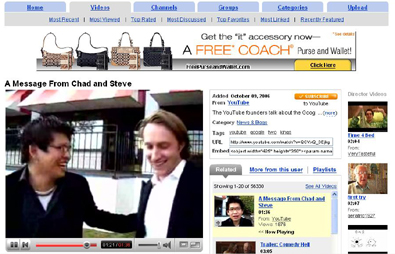From Google speak to YouTube speak

In “YouTube gets advertising religion: Google ad machine converts advertising averse YouTube” I note YouTube’s $1.65 billion Google induced about face on video advertising at YouTube:
YouTube’s submission to the Google juggernaut has a dramatic irony at its core: an online property averse to placing ads at its own Web site was wooed by the online property with the mission to put ads on every Web site!
I cite co-founder Steve Chen in a May Fortune magazine interview speaking about the then delicate nature of an advertising based monetization strategy for YouTube:
If we wanted to, we could instantly turn this into $10 million in revenue per month by running pre-rolls [short video ads] on the videos. But at the same time, we’re going to make sure that whatever revenue model we’ve built is going to be something that’s accepted by the users.
I also cite Julie Supan, YouTube’s senior director of marketing, in July’s MercuryNews “How will YouTube make money?”:
It’s not just a matter of whether or not the advertiser will find value. It’s also whether the users find value in it.‘ Don’t expect YouTube to embed commercials at the start or end of videos, she said. `We don’t think those things will be in line with our community.
Chad Hurley, YouTube co-founder, October 9, in the joint Google YouTube conference call announcing his sell out to Google:
This will allow us to, you know, with Google’s success in building a revolutionary new ad platform, this has inspired us to create a new model, a new platform for video content on the web…
In terms of pre-roll advertising specifically, I think we’re going to be exploring a lot of options, you know, utilizing Google’s advance ad technologies and you know, presenting a good experience that you know, benefits our users experience and also helps our partners monetise their content…
YOU KNOW, becoming a complete turncoat on the hyped YouTube ad-averse “community” in favor of the new $1.65 billion Google dictated advertising speak!
I often present at this Digital Micro-Markets Blog the irony of Google speak. My latest dissection of Google Speak, “Google Speak on copyright: Content owners beware”:
Google’s blog manifesto today “Our approach to content” (see “Google: Web friend or Web foe”) aims to portray Google as a champion of content owners’ rights. In typical Google fashion, Google took the blog route to indignantly put forth the Google “approach” and pre-released the blog post to chosen blogger few.
What Google apparently fails to realize, however, is that irregardless of its determined efforts to control and manipulate public opinion, Google statements, whether in print or in person, consistently reflect blatant Google-centric interpretations of the topic at hand. Today’s post on content is no exception.
Adam Lashinsky, Fortune, comments on his post YouTube sale “chat” with YouTube’s co-founders and notes YouTube speak:
Hurley…just might go far in the corporate world, should he choose to stay there. As the CEO, he's an on-message kind of guy, the kind of executive who's comfortable (or at least effective) giving the same answer he's given scores of times already, no matter what question you ask him. As a result, what he says is well-coached and of limited value, a skill that should please his new masters to no end.
Lashisky also re-traces YouTube’s infamous 100 million videos downloaded daily claim and notes the YouTube Google content owners come second stances:
First as a private company and now as an arm of a public company, YouTube enjoys the luxury of reporting only the statistics it chooses to. Hurley divulges neither the percentage of videos on YouTube that use copyrighted music that doesn't belong to the video creator nor the number of takedown notices YouTube receives from entertainment companies. (Under federal law, YouTube is required to remove content at the request of its rightful owners but isn't obligated to do so proactively. Google, you might recall, tells book publishers it'd be happy to exclude their books from Google's book search results - if they ask. GooTube sounds like a beautiful relationship already.) Hurley, by the way, told the FT three weeks ago they "don't have numbers" on takedown notices. He told me he knows but isn't saying. Details, details.
One last detail left unsaid is how many YouTube videos are being viewed on a daily basis. On Feb. 27, when Fortune's Oliver Ryan spoke to the company, it was 25 million. By the time I met with Hurley and Chen in their San Mateo, Calif., loft office in mid-April it was 40 million. By June, the number had grown to "more than 100 million." Today? "We're sticking with the hundred-million number for now," says Supan. "We'll wait for the next big milestone." At that, Chen chimes in "Which is one billion," to hearty laughter all around.
FADE TO "CHAD and STEVE" PRANCING IN YOUTUBE VIDEO CELEBRATING SELL-OUT TO GOOGLE: UNION OF "TWO KINGS"

ALSO SEE: "Google YouTube copyright ’safe harbor’ marriage"
"A ‘Dire Straits’ Web barter economy?: Links for nothing, content for free"
"Google to Yahoo, Microsoft, Amazon: Hand over confidential, competitive info"